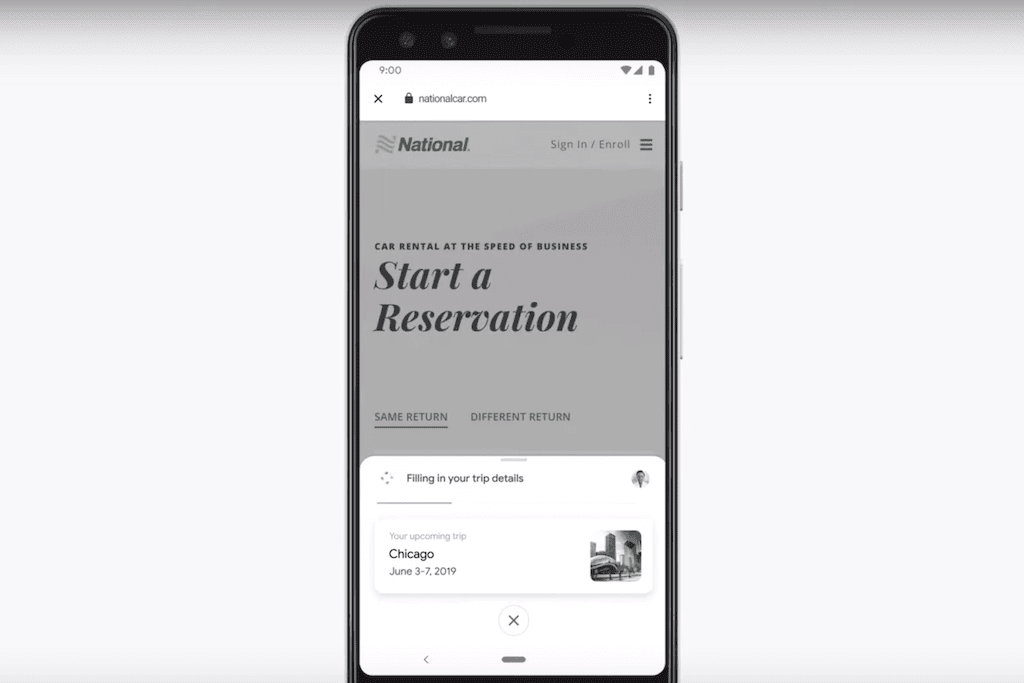Skift Take
It will be fascinating to see whether consumers embrace booking various elements of travel using Google Assistant. Perhaps more interesting is the way that Google Maps has become an all-purpose superapp in recent years.
Google Maps is an integral part of travel for many of its users, and a variety of new features are likely to make Google’s other services just as important.
The lines between Google Maps and the company’s other services are blurring rapidly, as Skift explored last month. Mapping, voice commands, navigation, augmented reality, and booking options have become more versatile, and travelers will have access to more ways to book trips and explore destinations.
During the keynote presentation at Google’s I/O 2019 developers conference on Tuesday, a variety of upgrades and innovations across the company’s digital ecosystem show the shape of how Google’s ambitions in travel will shift in the future.
Soon Google users will not only be able to book car rentals or make dinner reservations using artificial intelligence on the web but they’ll also be able to use image recognition to navigate the streets using augmented reality and receive more information on paintings and installations at museums around the world.
Here are the four most important takeaways from Google’s keynote presentation.
Image Recognition Meets Translation
Google Lens, the image recognition service baked into Google’s Android camera app, has been around for a few years. New features, though, will have interesting applications for tourists and business travelers.
More robust image recognition will allow users to scan menus at restaurants and be presented with an image of the dish, even if the user doesn’t understand the language of the menu. Lens can now read text out loud to you, either in the original language or translated to another.
Google is also working with museums to include additional information when a visitor scans a painting using Lens. This will help enhance the experience using digital tools, adding new elements to a self-guided tour.
Easy Travel Bookings Through Google Search
Google Assistant’s voice-controlled travel booking capabilities have evolved slowly over the last couple of years. During Tuesday’s keynote, Google executives demonstrated that the streamlined booking tool in Assistant will soon come to Google’s web users.
Users can type a request in Google Search, and Google will attempt to facilitate the booking through its own front-end, powered by information already attached to a user’s Google account.
The upcoming version of Google Assistant will be open to apps and deal with bookings via voice, something Google has dabbled in with mixed success so far.
More details will emerge soon, but it looks like app designers will have to create new integrations to make this happen. The service will roll out later this year and poses a variety of questions for travel companies that would prefer to have customers book directly.
Real-Time Translation Is Almost Here
A couple of years ago, Google launched wireless earbuds with supposed real-time translation capability. The result wasn’t as useful as the tech demo, but an application that works is still something of a holy grail for travelers.
While translation technology wasn’t a focus of the event, accessibility was a major focus. Google showed off new features like automated captions for video content, stronger voice recognition for those with speech impairments, and the ability for Android devices to transcribe speech into text instantly on a screen for those who may have trouble hearing, which was first announced in February.
It’s easy to see how real-time transcription can pave the way for real-time translation, something which Google attempted but made too awkward to pull off in practice.
Google Maps Extends Its Feature Set
The long-awaited navigation using augmented reality features will hit Google’s Pixel line of phones soon and will likely head to other handsets thereafter.
Instead of staring down at the spinning blue dot on your phone, trying to figure out where you are, you can hold your phone up and Google Maps will track your positioning using the phone’s camera.
Google is also revamping the recommendation engine in Google Maps to include things like events, widening the variety of suggestions it can make based on your prior behavior, as well.
Google wants to tell you what to do, though, not to further some altruistic goal. Travelers should consider following their own path instead of bowing down to a mysterious algorithm deployed to generate behavioral data Google can later monetize in a variety of unknown ways.
The Daily Newsletter
Our daily coverage of the global travel industry. Written by editors and analysts from across Skift’s brands.
Have a confidential tip for Skift? Get in touch
Tags: google, google maps, translation
Photo credit: An example from Google's video mockup of new Duplex features. Google
